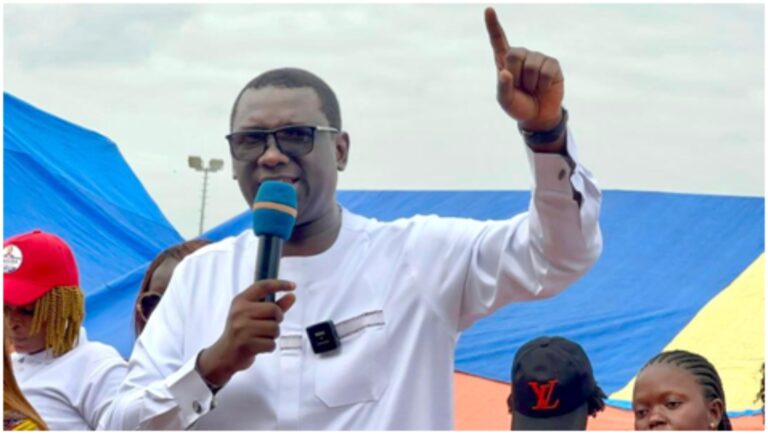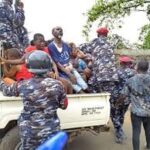By Chernor M. Jalloh,
Lecturer of Governance, Leadership & Development Studies
IPAM – University of Sierra Leone
The news hit like thunder across the Sierra Leonean cyberspace: “The United States Government Imposes Entry Ban on Sierra Leone.” Within hours, digital spaces were ablaze—Sierra Leonean bloggers, self-styled political analysts, and social media influencers went into overdrive, raining criticism on the government. To them, this was yet another indictment of President Bio’s administration. They declared it a diplomatic failure, a policy blunder, and a stain on our global image.
But allow me to challenge this shallow reading. This travel restriction is not merely a product of domestic leadership failures. It is a reflection of broader, more complex geopolitical shifts, and Sierra Leone is only one piece in a much larger puzzle. The simplistic narrative pushed by these online critics collapses under scrutiny and ignores important realities—historical, systemic, and strategic.
Visa Abuse: The Uncomfortable Truth We Ignore
Let’s begin with a brutally honest assessment that most social media critics conveniently overlook: a significant portion of the Sierra Leonean diaspora in the United States overstayed their visas or abused student entry permits. According to U.S. immigration records between 2017 and 2021, the overstay rate among Sierra Leoneans on B-1/B-2 (tourist and business) and F-1 (student) visas was notably high compared to other Sub-Saharan African countries. Many arrived with legitimate documents, only to disappear into the American underworld of undocumented life—working illegally, abandoning their studies, or engaging in fraudulent asylum claims.
These actions have long-term consequences. U.S. immigration policy, especially under restrictive administrations like Trump’s, has zero tolerance for non-compliance. When visa violations become systemic, countries get flagged. Sierra Leone is not alone in this. In 2017, the Trump administration also sanctioned countries like Eritrea, Cambodia, and Guinea for similar reasons. In 2020, the U.S. issued travel restrictions on Nigerians, citing security concerns and information-sharing gaps. Even Kenya, a key U.S. ally in East Africa, came under scrutiny over identity documentation.
So, why are bloggers blaming the current government alone, when these patterns of visa abuse stretch back over two decades and transcend administrations? Where was the outrage then? Or do we only remember failures when it is politically convenient?
The Geopolitical Undercurrent: Africa’s Shift from the West
What these critics also fail to recognize is that this visa ban cannot be separated from the deeper currents of global power politics. In an increasingly multipolar world, African nations—including Sierra Leone—are actively reassessing their strategic alliances. The monopoly once held by the United States and its Western allies over African affairs is being challenged.
Sierra Leone’s recent overtures toward Russia and China are not anomalies—they are part of a broader continental shift. The government’s ongoing negotiations with Russia for the construction of a nuclear power station marks a transformative milestone in our national development agenda. If successful, it will address our chronic energy deficit and bring affordable electricity to millions—something decades of Western aid never achieved.
Unsurprisingly, such moves attract scrutiny and subtle retaliation. The U.S. has a long history of using travel bans, visa sanctions, and diplomatic isolation to dissuade small nations from diverging from its strategic interests. In 2018, the Trump administration restricted visas to the International Criminal Court investigators when they probed alleged U.S. war crimes in Afghanistan. In 2019, the U.S. restricted travel visas for Cuban officials in response to their alliance with Venezuela.
What makes Sierra Leone’s case different? Nothing—except that we’re not used to interpreting these decisions through a geopolitical lens. We’ve internalized a narrative of inferiority and dependency for too long.
Leadership is Not the Culprit—Let’s Look at the System
It is intellectually lazy to heap all blame on President Bio and his cabinet. Leadership, while significant, operates within systems and legacies—many inherited, some imposed. The immigration systems that fail to process visas efficiently, the identification documents that do not meet international biometric standards, and the population data gaps—all of these problems predate the current administration.
More importantly, Sierra Leone’s internal security and civil registry reforms have made tangible progress. The National Civil Registration Authority (NCRA) is actively digitizing identity records, and steps have been taken to strengthen travel documentation and citizenship verification. But reforms take time, and perfection is elusive, especially in post-conflict societies.
Blaming the government for systemic challenges—some of which are rooted in colonial-era infrastructure and decades of neglect—is not only unfair; it is counterproductive.
Other Countries Have Faced It—and Rose Above It
Sierra Leone is not a lone victim. We are part of a broader pattern of African nations being held to ever-changing and often politically motivated immigration standards. Consider Nigeria: in 2020, the U.S. imposed visa restrictions on Nigerian citizens, citing lack of data sharing. Yet Nigeria is Africa’s largest economy and a major U.S. trading partner. The ban had little to do with diplomatic relations and everything to do with enforcing American migration control.
Chad, too, was added to the U.S. travel ban list under the Trump administration, despite being a partner in counterterrorism. In an act of rare defiance, President Idriss Déby Itno declared a reciprocal entry restriction on American citizens—an act that was widely applauded across Africa as a dignified stand.
We should draw inspiration from that. The message is clear: countries must assert their sovereignty, not apologize for it.
Development, Not Dependency: The Road Ahead
Rather than seeing the visa ban as a slap in the face, we should see it as a sobering opportunity. It is time for us to wake up and ask: What are we doing to make Sierra Leone a country people aspire to live in, rather than flee from?
The answer lies in rethinking our development strategy. Energy self-sufficiency is a powerful place to start. Sierra Leone’s potential in hydropower, solar, and nuclear energy is enormous. The partnership with Russia to construct a nuclear reactor, if executed with transparency and safeguards, could revolutionize our manufacturing, education, and healthcare sectors.
Additionally, China’s Belt and Road Initiative offers opportunities to modernize infrastructure, build roads, and finance industrial zones. Turkey has increased its presence in African education, security training, and commercial exchange. The United Arab Emirates is investing in logistics and port development across West Africa.
These are not mere diplomatic flirtations—they are options. And for a nation like ours, whose history has been defined by exploitation, the right to choose new paths is both radical and necessary.
To the Bloggers: Let’s Elevate the Discourse
I want to speak directly now to my fellow Sierra Leoneans who dominate social media discourse. Criticism is your right. Dissent is healthy. But let us not outsource our thinking to foreign media or mimic Western outrage without context.
When you criticize the government, do so constructively. Ask deeper questions: Why are we dependent on foreign education systems? Why have our youth lost faith in local opportunities? What is our plan to retain talent, not export it?
Let’s shift the conversation. Let’s hold our government accountable for strengthening public institutions, not for visa bans beyond their control. Let us demand investments in vocational education, public service reforms, healthcare delivery, and digital innovation. That is the real work of nation-building—not hashtags, not blame games.
Conclusion: From Reaction to Reimagination
We’ve been reacting for too long—to crises, to bans, to aid conditionalities. It’s time we reimagine. This visa ban, as painful as it seems, may just be the catalyst we need to wake up to the hard truth: nobody will build Sierra Leone but us.
We must cultivate pride—not the hollow pride of sloganeering, but the transformative pride of production, innovation, and self-reliance. We must stop romanticizing foreign lands while devaluing our own. For every young Sierra Leonean who dreams of escaping to America, we must create ten more who dream of building here.
Let the U.S. keep its gates. We are laying foundations. Let them issue bans. We are issuing blueprints. Let them close their borders. We are opening our minds to a world of partners that see us not as burdens, but as equals.
The future of Sierra Leone will not be stamped in a passport. It will be etched in the way we rise, together, with vision, dignity, and unshakable resolve.







Cities’ message to world leaders: Unlock direct climate finance for Africa’s urban future